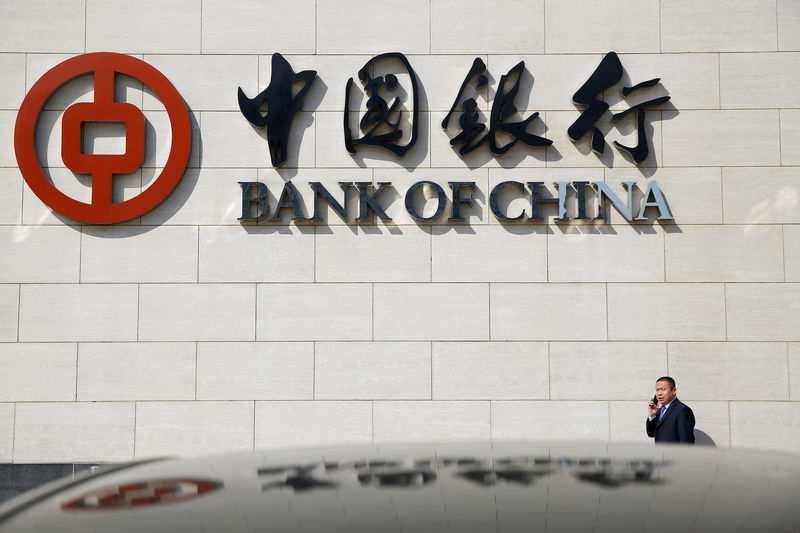By Matthew Miller and Shu Zhang
BEIJING (Reuters) - China's biggest banks are beefing up their risk management and compliance programs, following a series of high-profile judicial investigations and regulatory probes in the United States and Europe.
These legal and regulatory headaches are likely to be a drag on their aggressive overseas expansion until suitable anti money-laundering (AML) and know-your-customer (KYC) controls are in place, bankers and compliance experts say, but they are taking action.
A survey by LexisNexis Risk Solutions, which provides compliance services to China's big state-owned commercial banks and smaller financial services companies, showed that about half expect to increase their compliance budgets by 20 percent or more this year, and the rest will raise it by a lesser amount.
"Chinese banks are going through a learning curve," said Ellen Zimiles, Global Head of Investigations and Compliance at Navigant Consulting in New York. "They're going to have to come up to standards if they're going to have branches in the United States and Europe." China's top four banks, which together control $700 billion of overseas assets, have added more than 70 branches and offices to their global network in the last three years, following Chinese businesses abroad and extending their reach in countries from the Czech Republic to Chile.
The expansion has exposed shortcomings.
Last year the U.S. Federal Reserve instructed both Bank of China Ltd (BoC) and China Construction Bank Corp (CCB) (HK:0939) <601939.SS> to improve their AML procedures.
Their failings pale next to the abuses some European banks have been recently fined for by U.S. authorities, but a senior banking source said the deals BoC and CCB struck with the Fed would likely prevent them opening new branches or lines of business for at least three years. In Spain, six Industrial and Commercial Bank of China Ltd (ICBC) <601398.SS> (HK:1398) bankers were arrested in February, suspected of facilitating money laundering and fraud. The bank has said it implemented AML regulations and operated strictly within the law.
In Italy, prosecutors are seeking a trial for BoC officials in a money laundering investigation into billions of euros allegedly smuggled back into China. BoC has denied any wrongdoing.
Global Financial Integrity, a Washington-based watchdog, estimated that in the decade between 2004 and 2013 China was the world's biggest source of illicit outflows, accounting for about 28 percent of the $4.885 trillion in illicit funds moving from the 10 biggest source economies.
CULTURE CLASH
The banks are responding with more training and an overhaul of their compliance systems.
BoC said it was implementing a three-year plan to provide special AML training for management and staff, with the aim of producing 200 certified AML specialists.
In its deal with the Federal Reserve, CCB agreed to revamp its transaction controls, oversight and reporting.
ICBC said last year it had improved its AML systems and supervision of overseas institutions, measures it said "effectively prevented the anti-money laundering compliance risk and reputational risk".
Each ICBC overseas branch has an AML mechanism compliant with local regulation, a Beijing-based ICBC spokesman told Reuters.
In 2015, ICBC Europe purchased an advanced European AML monitoring system to enhance the bank's AML mechanisms in Europe, the spokesman said.
However, one foreign regulator who is responsible for overseeing Chinese lenders in an Asian geography, said the big state banks still lacked adequate risk management, experienced officers, and international staff in central compliance departments.
"Chinese banks have much lower compliance standards than foreign banks," the regulator said.
Even China's own banking regulator warned lenders in April about "the complexities" of operating overseas, and asked them to increase on-site due diligence for offshore borrowers.
"There's the desire and the need to adopt these practices, they just may not have the experience," said Tom Brown, senior vice president for LexisNexis Risk Solutions.
There is also, said Brown, a tendency among Chinese banks to prefer homegrown technology, rather than include tried-and-tested third-party solutions as part of their due diligence and compliance procedures, as is common with Western banks.
Perhaps the biggest challenge, however, is changing the culture at banks where compliance has long played second fiddle to new business generation.
"It's important that compliance people serve an independent role and can go head-to-head with a business person," said Zimiles.
That remains a work in progress.
"The branches don't always listen to us," said a banker at the foreign branch credit risk department at the headquarters of a big state-owned commercial lenders.

"It's a thankless job. There's constant conflict with the business side," the banker said.